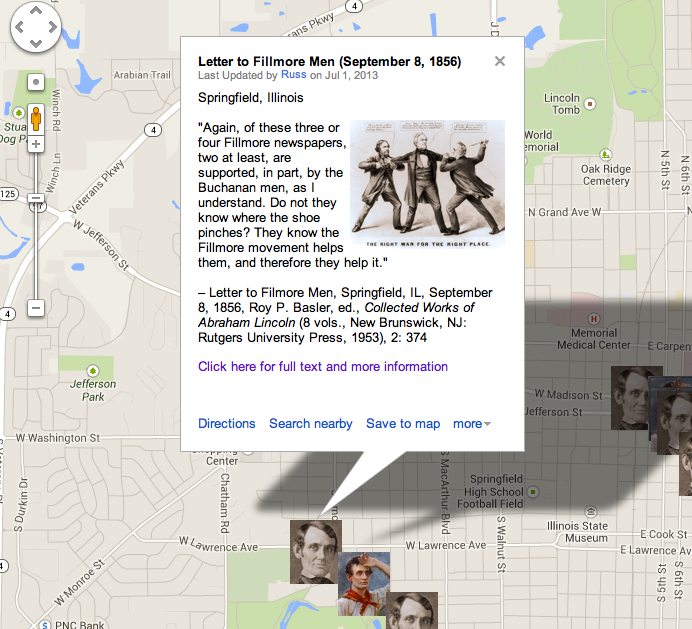Ranking
#105 on the list of 150 Most Teachable Lincoln Documents
Annotated Transcript
On This Date
HD Daily Report, September 8, 1856
The Lincoln Log, September 8, 1856
Custom Map
How Historians Interpret
“Lincoln recognized that the Republican party faced formidable problems in the 1856 presidential contest. Not only was it a new and imperfectly articulated organization, but it had powerful competition. . .The nativists, now calling themselves the American party, nominated ex-President Millard Fillmore, whose highly respectable Whig antecedents made him attractive to conservatives of all persuasions. . .Lincoln offered low-key, reasonable arguments to persuade American voters opposed to the expansion of slavery not to waste their votes on Fillmore, who had no chance of winning. In private letters to old Whig friends, Lincoln made the same argument, stressing that a vote for Fillmore was really a vote for Buchanan. . .What effect Lincoln had on the outcome of the 1856 election in Illinois was hard for him or anybody else to determine. In Republican newspapers his speeches were invariably praised as ‘unanswerable,’ showing ‘great eloquence and power.’ Democratic papers described his speeches as ‘prosy and dull in the extreme.’ He himself was under no illusions about the impact of his campaigning. . .In the end, the canvass verified the prediction Lincoln had made at the start: ‘With the Fremont and Fillmore men united, here in Illinois, we have Mr. Buchanan in the hollow of our hand; but with us divided, . . . he has us.'”
–David Herbert Donald, Lincoln (New York: Simon & Schuster, 1995), 192-194
“On September 8, Lincoln wrote a form letter to the supporters of the American party’s candidate, arguing that Fillmore could only win if the election were thrown into the House of Representatives, where the former president might prevail as a compromise candidate. But that would never happen if Buchanan carried Illinois, whose electoral votes, when combined with those of the South and of the Democratic standard bearer’s home state of Pennsylvania, would assure his election. Therefore Fillmore backers in Illinois should vote for Frémont because Fillmore had no chance of carrying the state.”
NOTE TO READERS
This page is under construction and will be developed further by students in the new “Understanding Lincoln” online course sponsored by the House Divided Project at Dickinson College and the Gilder Lehrman Institute of American History. To find out more about the course and to see some of our videotaped class sessions, including virtual field trips to Ford’s Theatre and Gettysburg, please visit our Livestream page at http://new.livestream.com/gilderlehrman/lincoln

